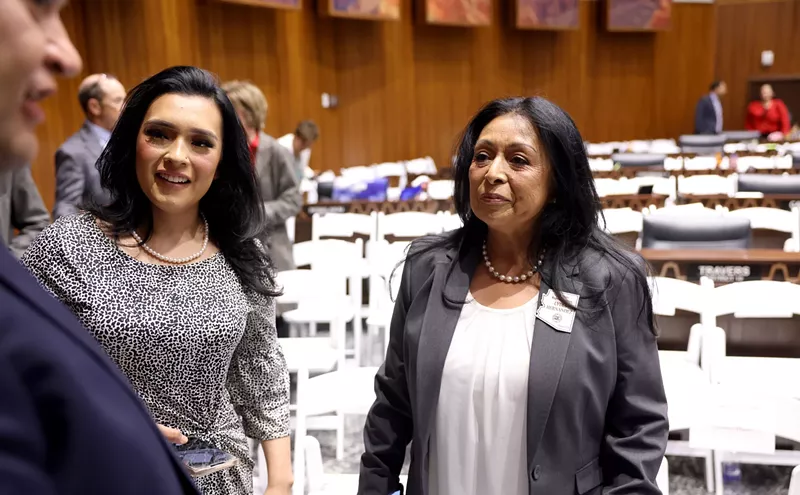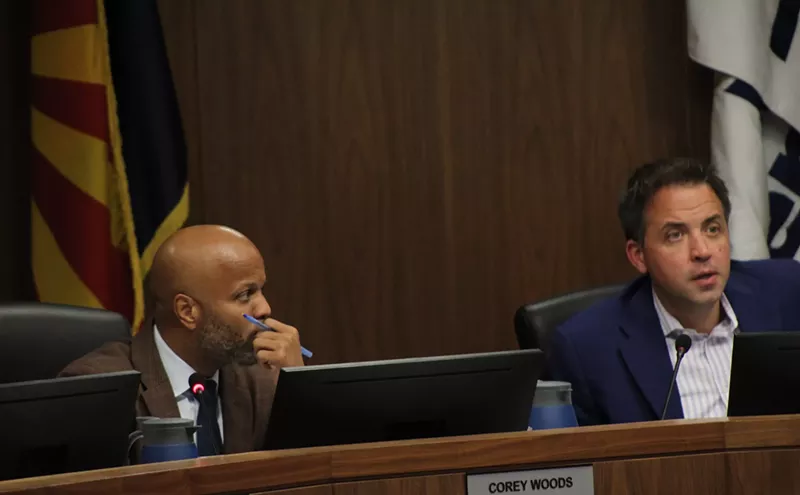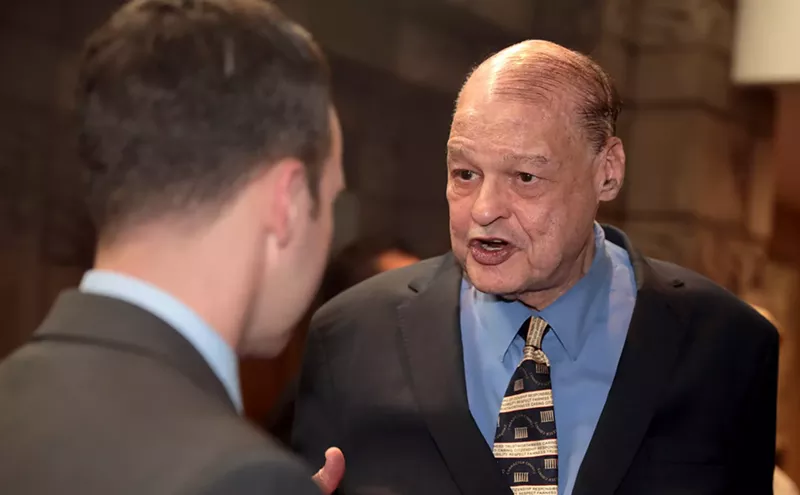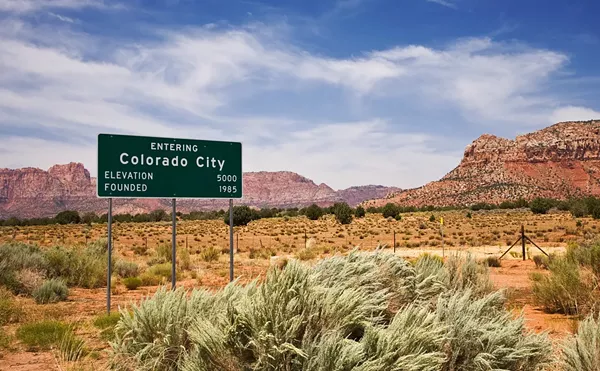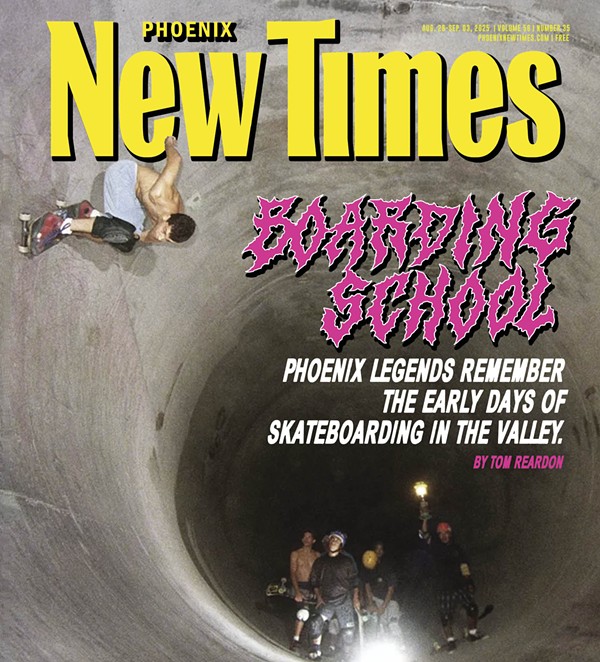Arizona's medical-marijuana program could be in for substantial changes if voters approve Proposition 205, which makes marijuana legal for all adults 21 and older.
Will Humble, former director of the Arizona Department of Health Services, says the impact on patients will depend largely on the director of the Department of Marijuana Licenses and Control, a new agency that would be created under the proposed law.
Besides making personal amounts of marijuana legal, Prop 205, also known as the Regulation and Taxation of Marijuana Act, would establish a system of cannabis-retail stores within existing medical-marijuana dispensaries. But that's just the start of the renovations to the medical program. Another fundamental difference is that oversight of the medical-marijuana program would transfer from the state DHS to the new agency.
The overall number of marijuana stores in Arizona won't be one of the big changes. Existing nonprofit medical-marijuana dispensaries would get first dibs on the approximately 150 retail-marijuana licenses. Under Prop 205, the 99 dispensaries now operating, along with 31 more the state is in the process of adding, would convert to "reorganized" marijuana establishments — businesses that could sell retail or medical weed.
Card-holding patients wouldn't have to pay the 15 percent excise tax on the sale of retail marijuana. But obtaining a medical-pot card from the state costs about $300 annually — $150 to the state and another $150 on average to the referring physician who writes the recommendation. That means patients will have a decision to make. One possibility: The number of patients plummets as light users decide it's cheaper to skip the fees and pay the tax. If that happens, the nonprofit medical program and the products it offers could be reduced simply owing to the laws of supply and demand.
That's just one way that medical-marijuana patients could see fewer options, Humble says.
"Some of the future retail stores would probably elect not to continue the program, so the network of medical dispensaries would probably be thinner," he predicts.
The biggest factor in the decision of business owners to provide both a retail and a medical system or ditch medical would be the new marijuana department's governing rules, Humble says.
Rules for the medical-marijuana program as it is now were created by the state DHS in 2011, a few months after voters approved the program in a statewide election. About 100,000 Arizonans participate in the program, possessing and using marijuana legally under state law and buying it at the dispensaries.
The rule-making portion of Prop 205 is one of its lengthiest sections. Under the proposal, the Marijuana Licenses and Control agency could ditch the current medical-marijuana rules or continue using a modified version to govern medical sales. It could create new sets of rules for both retail and medical, or one new set of rules that governs both medical and retail sales.
The new rules would have to be adopted no later than September 1, 2017, and would take shape under the leadership of the agency's director, who would be appointed by the governor. The rules would dictate everything about marijuana sales in Arizona: security, transportation, advertising, pesticide testing, the type of inventory-control system used by the stores, and much more. The department, adhering to typical rule-making procedures, would release a draft for public review, then hold public hearings and take recommendations before approving a final version.
Humble says local leaders, activists, and anyone else concerned about the retail-marijuana system would work should get involved in the rule-making process if Prop 205 passes.
In Colorado and Oregon, retail and medical sales are often conducted side by side in the same shop. Washington, though, drew criticism in July when it shuttered medical-marijuana facilities that had not been licensed under the state's new recreational-marijuana law.
If the new director of the Arizona marijuana agency adopts roughly the same rules for the medical program it has now, then Humble foresees minimal impact.
Another possibility is that the new agency puts together new regulations that make it difficult for dispensaries to retain their medical-side sales. Out of convenience or because the money-making potential would be higher, most dispensaries might elect to go strictly retail, Humble says.
Under that scenario, patients would be forced to drive much farther for their cannabidiol-heavy weed or medicated skin lotion, only to be hit with the insult-to-injury excise tax.
Of course, patients could choose to grow their own marijuana, freed from the existing restriction that prohibits personal cultivation within 25 miles of an operating dispensary. And if demand dictated a need, for-profit retail stores likely would begin carrying a wide variety of products to attract customers — meaning medical patients would be able to find what they need.
Jason Medar, leader of a pro-cannabis, anti-Prop 205 campaign, states on his website and in official campaign literature that the medical-marijuana program "could be DESTROYED in 2016!" Medar notes that the new, seven-member Marijuana Commission, of which three members must be principals in Arizona dispensaries, would help run the department.
"Allowing the people who make the MONEY to also make the RULES is a serious CONFLICT OF INTEREST!" Medar's literature blares.
But in reality, the Marijuana Commission would have no power to veto or approve the rules. Its role is explicitly defined in the law and is restricted, for the most part, to approving or denying retail licenses.
Humble believes the new law could not dismantle the 2010 law, the essentials of which are protected by the 1998 Voter Protection Act.

Audio By Carbonatix
[
{
"name": "GPT - Billboard - Slot Inline - Content - Labeled - No Desktop",
"component": "21251496",
"insertPoint": "2",
"requiredCountToDisplay": "2"
},{
"name": "STN Player - Float - Mobile Only ",
"component": "21327862",
"insertPoint": "2",
"requiredCountToDisplay": "2"
},{
"name": "Editor Picks",
"component": "16759093",
"insertPoint": "4",
"requiredCountToDisplay": "1"
},{
"name": "Inline Links",
"component": "17980324",
"insertPoint": "8th",
"startingPoint": 8,
"requiredCountToDisplay": "7",
"maxInsertions": 25
},{
"name": "GPT - 2x Rectangles Desktop, Tower on Mobile - Labeled",
"component": "21934225",
"insertPoint": "8th",
"startingPoint": 8,
"requiredCountToDisplay": "7",
"maxInsertions": 25
},{
"name": "Inline Links",
"component": "17980324",
"insertPoint": "8th",
"startingPoint": 12,
"requiredCountToDisplay": "11",
"maxInsertions": 25
},{
"name": "GPT - Leaderboard to Tower - Slot Auto-select - Labeled",
"component": "17012245",
"insertPoint": "8th",
"startingPoint": 12,
"requiredCountToDisplay": "11",
"maxInsertions": 25
}
]


